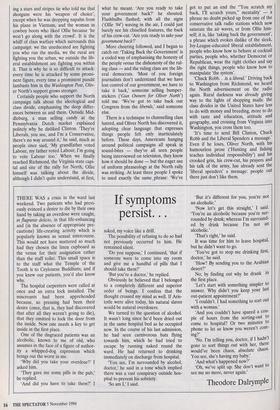If symptoms
persist. . .
THERE WAS a crisis in the ward last weekend. Two patients who had previ- ously evinced a desire to die by their own hand by taking an overdose were caught, in flagrante delicto, in that life-enhancing and (in the absence of appropriate pre- cautions) life-creating activity which is popularly known as sexual intercourse. This would not have mattered so much had they chosen the linen cupboard as the venue for their assignation rather than the staff toilet. This small space is to the staff what the Temple of the Tooth is to Ceylonese Buddhists; and if you knew our patients, you'd also know why.
The hospital carpenters were called at once and an extra lock installed. The miscreants had been apprehended because, so pressing had been their desire (once, that is, they had discovered that after all they weren't going to die), that they omitted to lock the door from the inside. Now one needs a key to get inside in the first place.
One of the disgraced patients was an alcoholic, known to me of old, who assumes in the face of a figure of author- ity a whipped-dog expression which brings out the worst in me.
`Why did you take your overdose?' I asked him.
`They gave me some pills in the pub,' he replied.
`And did you have to take them?' I asked, my voice like a drill.
The possibility of refusing to do so had not previously occurred to him. He remained silent.
Do you suppose,' I continued, 'that if someone were to come into my room and give me a handful of pills that I should take them?'
`But you're a doctor,' he replied.
Obviously he believed that I belonged to a completely different and superior order of beings. I confess that the thought crossed my mind as well. If Aris- totle were alive today, his natural slaves would be natural overdosers.
We turned to the question of alcohol. It wasn't long since he'd been dried out in the same hospital bed as he occupied now. In the course of his last admission, he had seen carnivorous bats flying towards him, which he had tried to escape by running naked round the ward. He had returned to drinking immediately on discharge from hospital.
`You see, I'm surrounded by alcohol, doctor,' he said in a tone which implied there was a vast conspiracy outside hos- pital to prevent his sobriety.
`So am I,' I said. `But it's different for you, you're not an alcoholic.'
`Now let's get this straight,' I said. `You're an alcoholic because you're sur- rounded by drink; whereas I'm surround- ed by drink because I'm not an alcoholic.'
`That's right,' he said. It was time for him to leave hospital, but he didn't want to go. `You've got to stop me drinking first, doctor,' he said. `How? By sending you to the Arabian desert?'
No; by finding out why he drank in the first place. `Let's start with something simpler to answer. Why didn't you keep your last out-patient appointment?' `I couldn't. I had something to sort out with a woman.'
`And you couldn't have spared a cou- ple of hours from the sorting-out to come to hospital? Or two minutes to phone to let us know you weren't com- ing?' No. I'm telling you, doctor, if I hadn't gone to sort things out with her, there would've been chaos, absolute chaos. You see, she's having my baby.'
`And what's happened now?' `Oh, we've split up. She don't want to see me no more, never again.'
Theodore Dalrymp le










































































 Previous page
Previous page